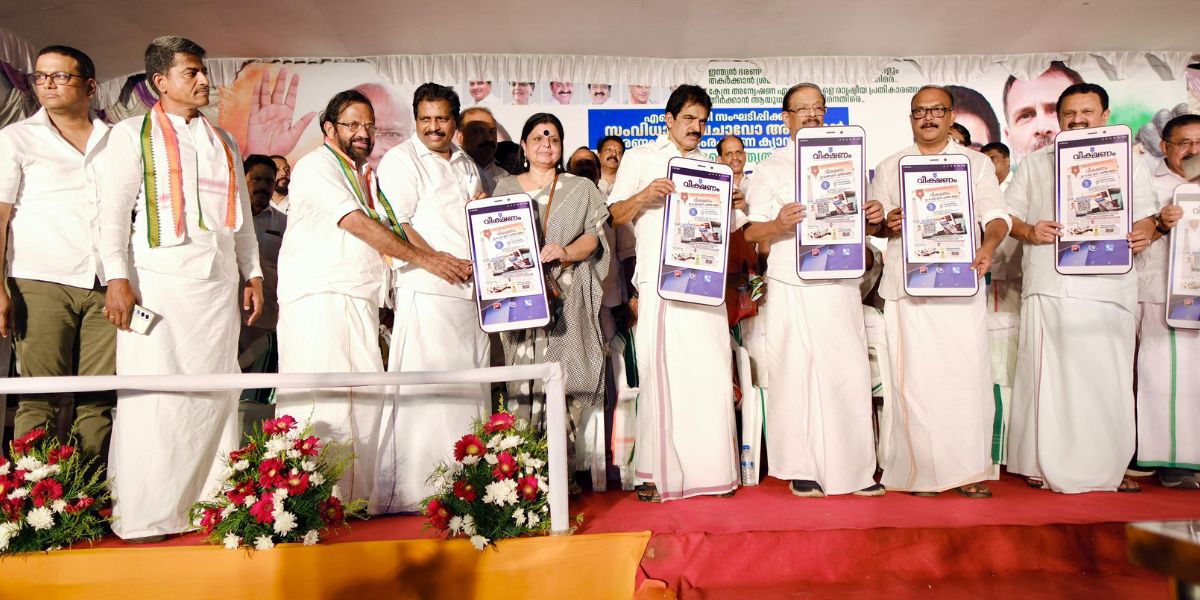Some leaders have cautioned against the optics of appointing a Christian leader to the party's top post in the state, without addressing broader organisational concerns.
Published May 06, 2025 | 11:19 AM ⚊ Updated May 06, 2025 | 11:19 AM

Congress leaders during an event in Thiruvananthapuram in Kerala. (X)
Synopsis: Grievances from senior Congress leaders have reportedly stalled the announcement of the Kerala unit head of the party, intensifying the ongoing leadership crisis.
Multiple grievances from senior Congress leaders have reportedly stalled the announcement of the new Kerala Pradesh Congress Committee (KPCC) president, intensifying the ongoing leadership crisis within the state unit of the party.
Sources within the grand old party said the delay has triggered internal rifts and fuelled media speculation, forcing the central leadership to tread cautiously ahead of the upcoming local body and Assembly elections, which are crucial for the party.
Ramesh Chennithala, Shashi Tharoor, and K Muraleedharan, who reportedly are in favour of incumbent K Sudhakaran, have raised concerns with Mallikarjun Kharge and Rahul Gandhi.
Their primary contention is that any leadership change must be meaningful and not merely symbolic. Some leaders have also cautioned against the optics of appointing a Christian leader to the party’s top post in the state, without addressing broader organisational concerns.
Meanwhile, CPI(M) State Secretary MV Govindan commented on the internal turmoil within the Congress in Kerala, saying that the party has been undergoing a major internal crisis.
“The issue is not about who holds the position of Congress president; the unrest within the party will persist well beyond 2026. Even Sudhakaran is admitting that efforts are underway to push him aside,” Govindan said.
Adding to the complexity, sources indicated that a few bishops have privately communicated to the central leadership that mere Christian representation would not suffice in securing the community’s support.
Meanwhile, the All India Congress Committee (AICC) General Secretary Deepa Dasmunsi — who is in charge of Kerala — is reportedly unhappy with the confusion surrounding the transition. She held closed-door meetings with senior leaders even after Sudhakaran received a warm farewell from Gandhi and Kharge in Delhi.
Even though Sudhakaran had expressed a willingness to continue until the next Assembly polls, he had also signalled readiness to step down gracefully, provided a successor was announced concurrently. The leadership’s failure to communicate his removal, coupled with delays and mixed signals, reportedly provoked Sudhakaran upon his return to Kerala, especially amid rumours that a successor had been finalised without his knowledge.
Support from senior leaders like Tharoor, Chennithala, and Muraleedharan emboldened Sudhakaran to stake his claim to continue. In a last-ditch effort, he even met former chief minister AK Antony. Tensions grew after Sudhakaran publicly claimed that some state leaders were trying to sideline him because of his health, which reportedly angered the leadership.
Initially, the central leadership was inclined toward naming MP Anto Antony, a close confidant of Congress General Secretary (Organisation) KC Venugopal, as the new KPCC chief. However, pushback from within the Kerala unit has delayed the formal announcement.
Meanwhile, Deepika, mouthpiece of the Syriac Catholic community, denied claims that the Catholic Church has been interfering in the selection of the KPCC president and sharply criticised the Congress leadership.
Its editorial emphasised that the Church has never demanded ministerial positions or the president’s post. It highlighted that what mattered was not the religion of the president but the party’s secularism.
The focus should be on ensuring justice without discrimination, rather than post distribution. The editorial also stressed the importance of constitutional adherence over party dominance.
(Edited by Muhammed Fazil with inputs from Sreelakshmi Soman.)
